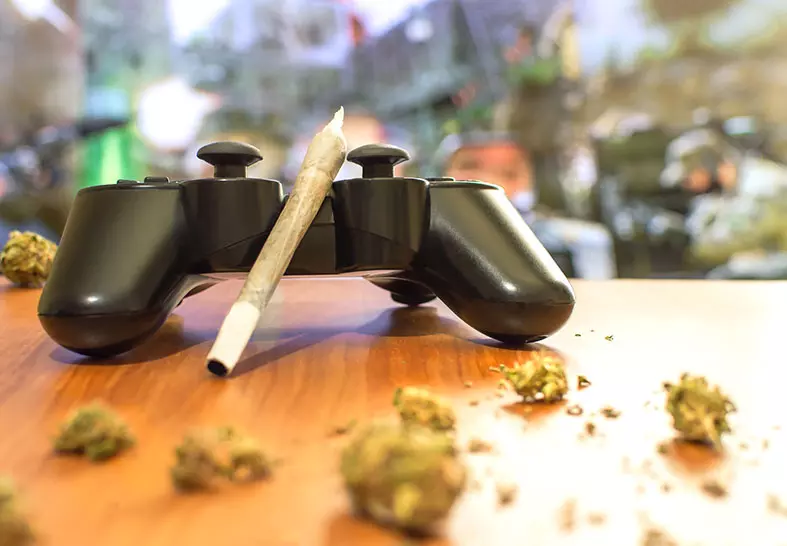Competitive professional gaming, or eSports (short for electronic sports), is a global billion-dollar industry. With significant growth year over year, the eSports industry is a modern-day gold rush. Data for 2022 shows that roughly 29.6 million people watch eSports every month, up 12 percent over last year. The popularity of the industry has helped fuel skyrocketing investment and ad revenue as gaming platforms like Twitch and YouTube give fans a direct connection to the players and teams. Esports are even becoming accepted as a varsity sport as the phenomenon goes global; in the US, 175 colleges and universities offer officially recognized eSports programs, some of which offer full scholarships for top players.

Weed and Video Games are Mainstream
Cannabis and eSports may seem like two completely different industries, but these two new flourishing markets have a lot in common — and it won’t be much longer before their similarities become apparent. They’re both new industries that are growing at a rapid rate, with growth being led by young entrepreneurs, driven by a new generation of people who believe both sectors will be a big part of the future.
Cannabis and eSports are both becoming normalized while fighting associated stigmas and stereotypes. The narrative of gamers being anti-social geeks and nerds is starting to change as the popularity of eSports grows. Cannabis users have faced much harsher scrutiny in regards to public perception; there are still plenty of people who think of cannabis consumers as lazy potheads, despite respected members of our society admitting to having smoked cannabis recreationally. However, it appears that things are starting to change as more people and politicians join the legalization train. With 37 states legalizing cannabis for medicinal or recreational use, it seems inevitable that, eventually, the entire country will accept cannabis as a legal substance.
Cannabis Bans for Pro Gamers
It’s ironic that, despite the similarities between the cannabis and eSports industries, weed has been banned from several eSports leagues during contests. Professional gamers competing in events run by the Electronic Sports League (ESL) are prohibited from marijuana use during competition. The ESL is one of the largest sports organizations in the world, and has an anti-doping policy that subjects players to saliva-based tests before competitions. Tests are performed at the discretion of the league at any time during tournament days. Any player who fails a test could face a wide range of penalties, including the loss of prize money, points deductions and even disqualifications — in some cases, a two-year ban from ESL events.
The ESL’s anti-doping policies have been up for debate since players have admitted to using drugs like Aderrall. Professional player Cory “Semphis” Friesen admitted he and his team used Adderall during a $250,000 ESL event. A stimulant that’s used to treat attention deficit hyperactivity disorder (ADHD), Adderall can also be used as a cognitive enhancer to aid alertness and concentration. Players who have prescriptions for Adderall and other drugs can compete in the ESL, if they provide a doctor’s letter or proof they are using it for medicinal purposes. The ESL has clarified that marijuana use outside of event days will not be punished, but that using it at any time, even medicinally, during competition is prohibited.
The ESL has formed new anti-doping policies with the help of the World Anti-Doping Agency (WADA), which aims to bring consistency to anti-doping policies and regulations in sports organizations and governments around the world. The head spokesperson for WADA, Ben Nichols, said that any substance that has the potential to “enhance sports performance, present health risks to athletes, or violates the spirit of the sport” should be included on the banned substances list. The argument that cannabis could present health risks to athletes seems far-fetched, especially considering there isn’t much cardiovascular activity involved in video gaming. However, the other two points are difficult to disprove, especially because one of the biggest problems with the federally illegal status of cannabis means that it hasn’t been widely studied, so there’s little clinical data on its specific health effects as compared to pharmaceutical drugs.
Final Thoughts on Cannabis & E-Sports
Who doesn’t enjoy gaming when they’re high? Cannabis and video games are a perfect match. Weed enhances the gaming experience, and most people who play video games do so to get their mind off of day-to-day life. Gaming provides an exciting escape from reality, and as technology advances, the experiences will too.
Some people see this as a bad thing, and believe that increased gaming will ultimately lead to kids refusing to go outside. However, eSports gaming provides a welcoming environment for anyone to get involved and enjoy the experience — just like cannabis does. It doesn’t matter how you use it, cannabis makes you a part of a larger community. And whether people like it or not, cannabis and eSports are both here to stay as they become more accepted in popular culture. Whenever there are changes in society, there will inevitably be pushback and growing pains, but in every industry, the future always wins.
